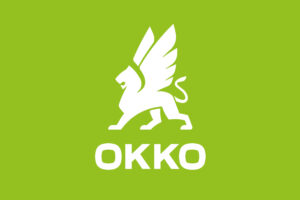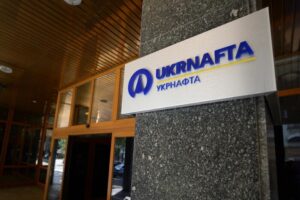
The OKKO filling station network currently occupies about 19% of the Ukrainian retail fuel market, said Vasyl Danylyak, CEO of the company.
“This is when we count the entire market, both black and gray, when everything is together, we operate with such figures,” he said in an interview with the Careerist YouTube channel.
According to Danyliak, OKKO currently ranks first in terms of market share in Ukraine, its gap with the second place, represented by WOG, is about 5 percentage points.
The CEO of OKKO also said that the group’s turnover in 2023 amounted to $2.4 billion, and EBITDA – $240 million.
“These are petroleum product retail, non-fuel business, wholesale, agro-trading, agro-financing, trade in mineral fertilizers, natural gas and electricity,” he said.
As reported, by the end of 2022, Danyliak estimated OKKO’s fuel sales market share at 25%, up 7 percentage points from 2021,
OKKO filling stations network is a part of OKKO Group. It is one of the largest filling station chains in Ukraine, with about 400 filling stations.
OKKO Group unites more than 10 diversified businesses in production, trade, construction, insurance, maintenance and other services. OKKO-Agrotrade division and Khlibprom concern operate in agriculture. The flagship company of the group is Galnaftogaz, which operates one of the largest filling stations in Ukraine under the OKKO brand.
The company’s majority shareholder is Vitaly Antonov. Minority shareholders include the European Bank for Reconstruction and Development (EBRD).

In the first quarter of 2024, Ukrnafta sold 52.6 mln liters of fuel in NAFTA cards and coupons. In particular, 18.7 million liters were sold in March.
The company’s press service reports.
In total, 140.4 million liters of fuel have been sold since the beginning of 2023, when the company launched its own B2B program.
The number of customers – public and private enterprises – exceeds 3 thousand.
Regional sales offices have been opened in Ivano-Frankivsk, Odesa, Dnipro, Lutsk, Khmelnytskyi, Vinnytsia, Kamianets-Podilskyi, Kharkiv, Zaporizhzhia, Poltava, Lviv, Cherkasy, and Mukachevo.
Ukrnafta coupons are accepted at 866 filling stations and cards at 1003 filling stations across the country, including SOCAR, Ovis, VST and other networks.

In January-March 2024, PJSC Ukrnafta sold 52.6 million liters of fuel using coupons and NAFTACard, including 18.7 million liters in March.
According to the company’s Facebook post, a total of 140.4 million liters of fuel have been sold since the beginning of 2023, when the company launched its own B2B program.
The number of customers – public and private enterprises – has exceeded 3,000, and regional sales offices have been opened in Ivano-Frankivsk, Odesa, Dnipro, Lutsk, Khmelnytsky, Vinnytsia, Kamianets-Podilskyi, Kharkiv, Zaporizhzhia, Poltava, Lviv, Cherkasy, and Mukachevo.
The company has also signed six inter-company agreements for coupons and nine for cards. Ukrnafta’s coupons are accepted at 866 filling stations and cards at 1003 filling stations across the country, including such networks as SOCAR, Ovis, VST, etc.
As reported, in 2023 Ukrnafta increased oil and condensate production by 3% (by 39.9 thousand tons) compared to 2022, to 1 million 409.9 thousand tons, and gas production by 5.8% (by 60.4 million cubic meters), to 1 billion 97.4 million cubic meters.
The company’s strategic goal is to double oil and natural gas production to 3 million tons and 2 billion cubic meters by 2027, respectively.
“Ukrnafta is the largest oil company in Ukraine and operates a national network of 537 filling stations, of which 456 are in operation. The company is implementing a comprehensive program to restore operations and update the format of its filling stations. Since February 2023, Ukrnafta has been issuing its own fuel coupons and NAFTAKarta cards, which are sold to legal entities and individuals through Ukrnafta-Postach LLC.
Ukrnafta’s largest shareholder is Naftogaz of Ukraine with a 50%+1 share. On November 5, 2022, the Supreme Commander-in-Chief of the Armed Forces of Ukraine decided to transfer to the state a share of corporate rights of the company owned by private owners, which is now managed by the Ministry of Defense.

In 2024, PJSC Ukrnafta increased the volume and expanded the geography of imported fuel supplies from global producers to the country, the company’s press service reported on Facebook.
According to the press service, while last year the company imported fuel from the United States, Sweden, Poland, and Greece, in 2024 it also began importing large wholesale consignments from Denmark, Slovakia, and Turkey.
“All fuels produced by such powerful companies as Orlen, HELLENiQ ENERGY, Marathon Petroleum Company and others have the appropriate certificates and, due to their optimal characteristics, are guaranteed to preserve engine life. We invite you to visit Ukrnafta filling stations and guarantee that your car will be satisfied with our quality,” the statement says.
“Ukrnafta is the largest oil company in Ukraine and operates a national network of 537 filling stations, of which 456 are in operation. The company is implementing a comprehensive program to restore operations and update the format of its filling stations. Since February 2023, Ukrnafta has been issuing its own fuel coupons and NAFTAKarta cards, which are sold to legal entities and individuals through Ukrnafta-Postach LLC.
Ukrnafta’s largest shareholder is Naftogaz of Ukraine with a 50%+1 share. On November 5, 2022, the Supreme Commander-in-Chief of the Armed Forces of Ukraine decided to transfer to the state a share of corporate rights of the company owned by private owners, which is now managed by the Ministry of Defense.

Prices for motor fuel will stabilize in early August after new batches of fuel will enter the market, taking into account excise duty in the price structure, according to the director of consulting group “A-95” Sergei Kuyun.
“This will happen when the volume of fuel with a new tax burden, which began to be cleared from July 1, will fully replace the old stocks. According to our expectations, this will happen in early August,” the expert said at a briefing at Ukrinform on Monday.
According to Kuyun, the wholesale market, which reacts much faster to fiscal changes, can serve as a certain predictive indicator for future fuel prices on the retail market.
“The wholesale market is characterized by the fact that operators have no residuals there, they work very quickly and incorporate all new circumstances and factors into prices very quickly. The wholesale market began to grow back in late June and today we have the following picture: for gasoline A-95 prices have increased by 7.74 UAH/liter, for diesel fuel – by almost 7 UAH/liter. In this market new taxes are already in place and it can be projected on future retail prices,” – said the director of “A-95”.
In turn, according to the consulting group, for the first week of July in the retail price of A-95 in the first week of July on average rose by 3 UAH – to 47.90 UAH / l, diesel fuel – by 3.45 UAH, to 46.86 UAH / l, liquefied gas – by 1.47 UAH, to 23.39 UAH / l.
“The main factor in the price rise was VAT, as this tax is paid immediately at the time of sale and immediately automatically came into effect. Further we expect that the price will gradually increase already at the expense of excise duty, excise duty is paid at the time of crossing the border,” the expert explained.
As he recalled, the tax burden on motor fuels from July 1 increased on A-95 – by 11 UAH/liter, diesel fuel – by 8 UAH/liter, liquefied gas – by 3 UAH/liter.
According to the director of “A-95”, in June in Ukraine there was a record level of imported diesel fuel supplies since the beginning of full-scale Russian aggression at the level of 650 thousand tons.
“Accordingly, this indicates that traders were preparing for this, brought a lot of low-tax fuel. This stock will now be realized and gradually motor fuel with new taxes will come to the market. And when this stock rotation is completed, then we can talk about the full integration of new taxes into the price,” summarized the expert.
As reported, in mid-March 2022, the Rada adopted a law on additional tax incentives to support business during the war, aimed, among other things, at keeping fuel prices down. According to it, temporarily, for the period of martial law, zero excise tax and VAT of 7% instead of 20% were set on fuel.
On September 21, 2022, the Rada passed Bill No. 7668-d on the return of excise taxes on motor fuel, setting them at EUR100 for gasoline and diesel (hereinafter – per 1,000 liters), EUR52 for liquefied gas, butane and isobutane, and EUR100 for alternative motor fuel and biodiesel. VAT for all types of fuel remained at 7%.
However, according to this document, from July 1, 2023 the level of fuel taxes returned to the pre-war level: VAT – to 20%, excise duty on gasoline – to EUR213, on diesel – to EUR140 per 1,000 liters.

Ukrainian nuclear power plants will be able to fully switch to fuel from the American company Westinghouse by the end of 2023, Ukrainian Energy Minister Herman Galushchenko said.
“We have quite optimistic forecasts and confirmation that our cooperation with Westinghouse will enable us to implement this process (provision of American fuel – ER) already by the end of this year,” the minister said on the air of national TV marathon “United News” on Thursday, referring to his visit to the American partners’ fuel fabrication plant.
At that he noted that Ukrainian specialists present at the plant “are doing a lot to produce the corresponding fuel as soon as possible in order to replace the Russian fuel.
Answering the presenter’s question about the prospects of nuclear fuel production in Ukraine, the head of the Ministry of Energy said: “We also have relevant agreements with Westinghouse to build a nuclear fuel production plant in Ukraine. There is no doubt that this will be done.
Along with this Galushchenko paid attention to the fact that the whole Europe is now very urgent to stop using Russian nuclear fuel.
“During our meetings with ministers of power of EU and USA we discussed in details that it is important to ensure fuel production in necessary amount as soon as possible in order to replace Russian fuel in European market”, – he explained, adding that it is impossible to quickly find nuclear fuel substitute, unlike, for example, for gas, because it is produced in certain amount, and increase of amount requires time.
At the same time the minister emphasized that the Russians have almost a monopoly position on the market of fuel for VVER-440 units.
“The Minister stressed that the Russian Federation is nearly a monopolist on the market of VVER-440 power units, therefore we are working to ensure that Westinghouse starts producing assemblies for these units this year which will help to get rid of strong dependence on Rosatom in this area.
As reported, in early March 2022, after a full-scale invasion of Ukraine by Russia, Energoatom completely abandoned the purchase of Russian nuclear fuel.
On June 2, at the Khmelnitsky nuclear power plant, Energoatom and the US Westinghouse signed an agreement to supply nuclear fuel to all Ukrainian nuclear power plants with 15 power units (currently 7 power units are loaded with this fuel – ER).
Before this in the very beginning of 2022 Peter Kotin, President of Energoatom, in his comments to Interfax-Ukraine noted that it would take Westinghouse about two years to be ready to cover the fuel demand of the NAEK for 13 existing VVER-1000 units, for which time the nuclear power plants have enough fuel.
Asked about the timing of Westinghouse fuel deliveries for the two VVER-440s at the Rivne NPP, Kotin indicated that the first batch of American fuel for VVER-440s will be delivered in 2025.
Then in a March 2022 interview with Interfax-Ukraine, Kotin explained that there were no questions about fuel for VVER-1000, while more effort was needed for fuel for VVER-440 so that Westinghouse would have time to provide supplies next year, which is 2023.
At the same time, Kotin noted that Energoatom is also optimizing fuel delivery schedules so that the U.S. partners can meet the fuel demand. According to him, due to the reduced consumption of electricity during the war, which resulted in reduced production, the units will be able to work longer on the fuel already brought in.
As part of the cooperation, Energoatom and Westinghouse launched a training program for Ukrainian nuclear specialists in the United States, under which more than 60 specialists and nuclear graduates will study the AP1000® technology.